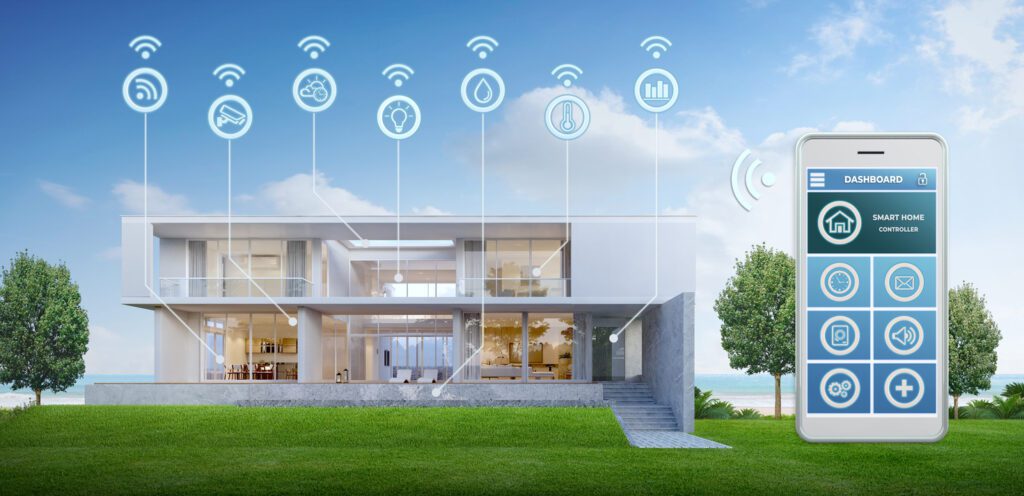In the not-so-distant future, our homes are poised to undergo a revolutionary transformation, becoming more intelligent and responsive than ever before. As we stand on the cusp of an era marked by rapid technological advancement, the trajectory of smart home technology is nothing short of fascinating. Incorporating state-of-the-art advancements like Artificial Intelligence (AI), the Internet of Things (IoT), and 5G connectivity holds the potential to enhance our living environments, elevating levels of efficiency, security, and convenience never before experienced.
The landscape of smart homes is evolving, extending beyond mere automation to embrace a holistic and personalized approach. Picture a home that learns your preferences, anticipates your needs, and seamlessly adapts to your lifestyle. From advanced security systems leveraging biometric authentication to interconnected devices fostering a harmonious living environment, the future of smart homes holds a tapestry of possibilities.
The journey into the future of smart home technology invites us to explore the forthcoming trends that will shape the way we live, interact with our surroundings, and envision the very concept of home. As we delve into these anticipated developments, it becomes evident that our homes are on the brink of becoming dynamic entities, attuned to our every desire and equipped with technologies that redefine what it means to dwell in the modern era. Join me on this exciting exploration of the Future Trends in Smart Home Technology, where the ordinary becomes extraordinary, and the homes of tomorrow beckon us into a realm of unparalleled connectivity and innovation
#1. Artificial Intelligence (AI) Integration:
- Intuitive Automation: Anticipate the integration of AI to enhance the intuitive nature of smart home systems. AI algorithms will learn user preferences, adapt to daily routines, and make automated decisions to optimize comfort and efficiency.
- Predictive Analysis: AI will utilize data from various sensors and devices to predict user needs, whether adjusting climate control based on historical patterns or automating routine tasks like grocery orders.
#2. Expansion of Internet of Things (IoT):
- Increased Interconnectivity: Expect a surge in the number of IoT devices, resulting in more interconnected and seamlessly communicating smart home ecosystems.
- Unified Control Platforms: Future smart homes may feature unified control platforms that allow users to manage a myriad of devices from a single interface, promoting a more cohesive and user-friendly experience.
#3. Enhanced Home Security Systems:
- Biometric Authentication: Envision the implementation of sophisticated biometric authentication techniques, including fingerprint scanning and facial recognition, to enhance and reinforce home security.
- AI-Powered Surveillance: Smart security cameras will leverage AI to distinguish between potential threats and normal activities, reducing false alarms and increasing overall security effectiveness.
#4. 5G Connectivity:
- Faster and More Reliable Connectivity: As 5G networks become widespread, smart home devices will benefit from faster and more reliable connectivity.
- Low Latency: Reduced latency in communication will enhance the responsiveness of smart devices, contributing to a smoother and more seamless user experience.
#5. Voice and Gesture Recognition Advances:
- Natural Language Processing: Voice assistants will evolve with more advanced natural language processing capabilities, making interactions more conversational and responsive.
- Gesture Control: Gesture recognition technology will likely gain prominence, allowing users to control devices with simple hand movements offering an alternative or complementary interface to voice commands.
#6. Energy Efficiency Innovations:
- Smart Grid Integration: Smart homes will increasingly integrate with smart grids, allowing for more efficient energy consumption based on real-time grid conditions.
- Renewable Energy Integration: Expect advancements in integrating sustainable energy sources, including solar panels and intelligent energy systems storage solutions, to make smart homes more sustainable.
#7. Augmented Reality (AR) in Home Design and Maintenance:
- Virtual Home Tours: AR will enable virtual tours, enabling prospective buyers or renters to remotely explore properties with an immersive and interactive experience.
- Maintenance Assistance: AR applications may provide real-time guidance for DIY repairs and maintenance, overlaying instructions on physical objects through smart glasses or mobile devices.
#8. Customization and Personalization:
- Adaptive Environments: Future smart homes will feature environments that adapt to residents’ preferences without explicit commands, creating personalized atmospheres for comfort, productivity, or relaxation.
- Individualized AI Profiles: Each member of a household may have an AI profile, ensuring personalized experiences tailored to individual preferences and habits.
#9. Health and Wellness Integration:
- Advanced Health Monitoring: Smart homes will incorporate more sophisticated health monitoring devices, seamlessly integrating data from wearables and sensors to provide comprehensive health insights.
- Ambient Wellness Features: Expect the integration of ambient features, such as circadian lighting, air quality management, and biometric feedback, to create wellness-driven living spaces.
#10. Sustainability and Eco-Friendly Features:
- Smart Water Management: Future smart homes will integrate intelligent water management systems to optimize usage and detect leaks promptly.
- Waste Reduction: Advanced waste management solutions, including smart recycling bins and composting technologies, will contribute to reducing environmental impact.
In conclusion, the future of smart home technology promises advanced AI, IoT, connectivity, and sustainability, creating homes that are not only intelligent and efficient but also deeply attuned to the unique needs and preferences of their occupants. As these trends unfold, smart homes will continue to redefine the way we live, offering unprecedented levels of comfort, security, and sustainability. If you’re new to home buying and seeking direction on the initial steps, explore my course Your First Home and stay tuned for a future where homes truly become an extension of our lifestyles and values.


